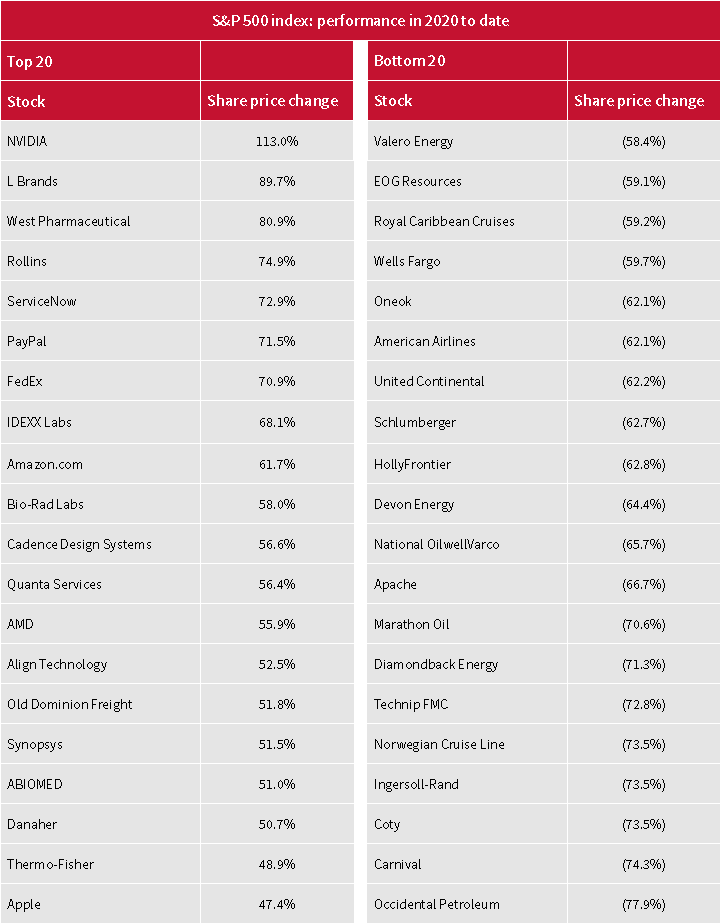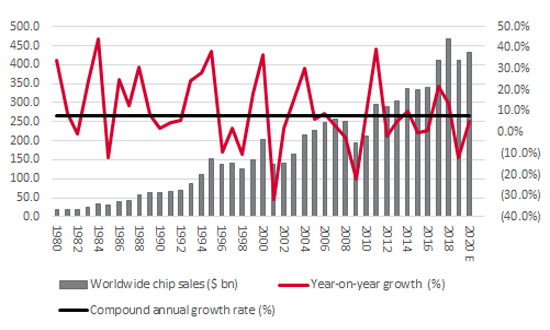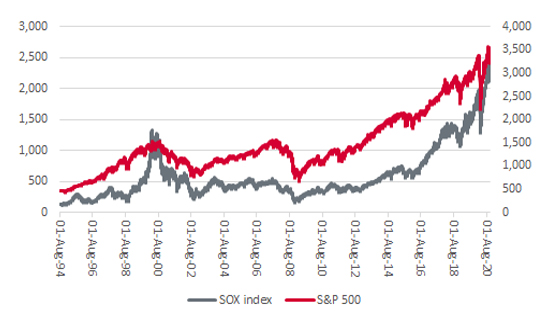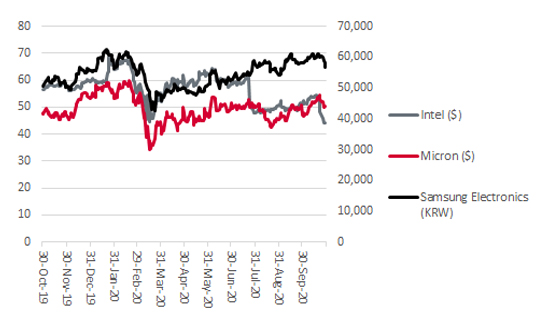


For all of the headlines that they understandably generate, the heavyweight sextet of Facebook, Alphabet, Amazon, Apple, Netflix and Microsoft are not the only names that matter in the broad technology sector. Granted, Amazon and Apple are among the 20 best performers in America’s benchmark S&P 500 index in 2020 to date, but so are several other tech or tech-related firms, notably two: silicon-chip makers NVIDIA and Advanced Micro Devices.
Technology dominates the list of the S&P 500’s best performers (oil dominates the worst)

Source: Refinitiv data
“The semiconductor industry is worth over $400 billion in annual sales and not one of smart phones, cars, computers, servers, smart meters, or anything else electronic you can think of, can function without silicon chips.”
This is a marked contrast to the woes of the oil sector, which provides no less than 12 of the 20 worst performers. That will not stun too many advisers or clients after the oil price’s swan dive, and the strong showing of silicon chip stocks should not be such a surprise in some ways either. After all, the semiconductor industry is worth over $400 billion in annual sales and not one of smart phones, cars, computers, servers, smart meters, or anything else electronic you can think of, can function without them.
Global silicon chip sales are expected to rise by 5% in 2020

Source: WSTS, SIA, Statista, consensus analysts’ forecasts
The importance of the semiconductor industry is evidenced by how it can point to a compound annual sales growth rate of 8% over the past 40 years, albeit with some big swings and roundabouts along the way. As a result, advisers and clients should really pay attention, although it is not easy to do this through the lens of the UK stock market, which is not particularly blessed with companies from this industry.
The paucity of UK-based options really means that advisers and clients have to look stateside for their fill of chip stocks and the Philadelphia Semiconductor index, or SOX, allows this to be done with ease. All but of a couple of the benchmark’s 30 members hail from the US, and it can be tracked for free on the internet.
“As a scratch-and-sniff test, the SOX has two uses. The first is as a barometer for economic activity. The second is as a guide to market risk appetite.”
As a scratch-and-sniff test, the SOX has two uses.
The first is as a barometer for economic activity. The sheer ubiquity of silicon chips means that they are a pretty fair proxy for economic growth and broader end-market demand. A consensus forecast of 5% sales growth in 2020 looks pretty good given the broader economic backdrop, and is testimony to how chip sales are getting a boost from the pandemic thanks to higher demand for servers and cloud computing capacity; bandwidth-providing telecoms equipment; and laptops and home computing. Beyond such mega-trends, the members of the SOX index are very driven by product and inventory cycles – their order books will be among the first to notice any subtle shifts in customer behaviour which may be indicative of a wider economic trend that is coming around the corner in a few months’ time.
The second is as a guide to market risk appetite. Chip stocks are traded as momentum and growth stocks, doing well when earnings estimates are going up and badly when they are going down. In addition, the SOX can be fair guide to stock markets more generally. The index peaked before the wider US stock market in both 2000 and 2007, and bottomed before headline indices such as the S&P 500 began to find their footing in 2002 and 2009.
Peaks in the SOX index warned of wider financial market difficulties ahead

Source: Refinitiv data
The SOX has had a stunning run in 2020, reaching a new record high in mid-October, to further exemplify how financial markets have feasted off central banks’ monetary stimulus, fed off hopes for fresh fiscal stimulus and sought to peer through the pandemic to an eventual economic upturn.
“The SOX index has just rolled over in the past month or so, weighed down by cautious comments from leading constituents such as Intel and Micron, as well as Asian chip-making giant Samsung Electronics.”
Yet the indicator has just rolled over in the past month or so, weighed down by cautious comments from leading constituents such as Intel and Micron, as well as Asian chip-making giant Samsung Electronics. All three cited weaker future demand for servers thanks to an inventory pileup.
Coming after gloomy commentary from Cisco, IBM and German enterprise software-specialist SAP, all of whom flagged increasing corporate caution when it came to spending money, there is perhaps a growing danger of a double-dip recession as companies cut back even further due to the uncertain outlook.
“There is perhaps a growing danger of a double-dip recession as companies cut back even further due to the uncertain outlook, although it is always possible that dramatic further action from central banks renders such fundamental analysis largely irrelevant, at least when it comes to share prices.”
Bellwether chip stocks have stumbled of late

Source: Refinitiv data
It is not just corporate tools which contain silicon chips, but consumer gadgets too. So as we head into the Christmas selling season, it will be interesting to see if the SOX starts to sag or whether it can maintain this year’s strong run – although it is always possible that dramatic further action from central banks renders such fundamental analysis largely irrelevant, at least when it comes to share prices.
This area of the website is intended for financial advisers and other financial professionals only. If you are a customer of AJ Bell Investcentre, please click ‘Go to the customer area’ below.
We will remember your preference, so you should only be asked to select the appropriate website once per device.